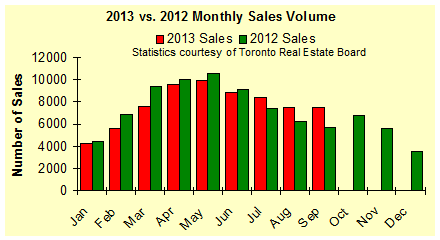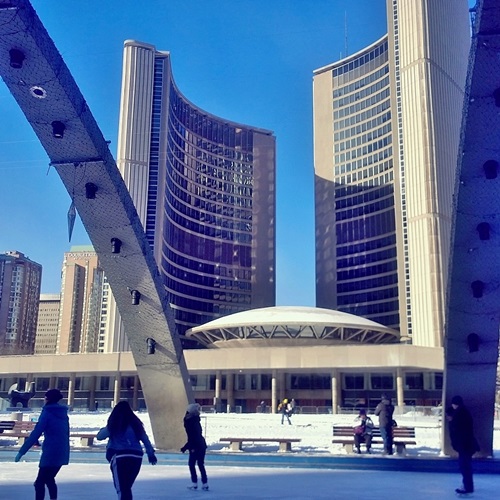Toronto Income Property Newsletter – November 2013
Get out your winter coats – leaves are falling and the cold weather is upon us. We are nearing the end of the year which means only another five or six weeks before the real estate market slows down as we get into the Christmas holidays. This year has very much been a Sellers’ market in the GTA and there have been fewer income properties for sale this year than normal. Let’s hope 2014 turns around a little.
*
Adding a Basement Apartment or Rental Suite to your Property
As I mentioned above, we saw a lot fewer duplexes and triplexes hit the market in downtown Toronto this year. This led many investment-minded buyers to contemplate houses with basement apartments or houses that had potential to create a second suite.
Cutting a property into two, or “duplexing” it, is an excellent way to help offset your home’s carrying costs. There are a number of points that I often address when I talk to clients about adding a new apartment within a property. Here are some of the most often asked questions and concerns.
1. What defines a second suite?
A second suite is a self-contained, rental apartment in a single or semi-detached house. In most areas of downtown Toronto, second suites have existed for many years, providing tenants with affordable rental accommodation in neighbourhood settings while generating rental income for homeowners. An estimated 20% of all rental housing in Toronto is found in private homes as second suites.
Many second suites are basement apartments, but they can be installed on any floor of the house including the attic. They have also been called granny flats, accessory apartments and in-law suites. Usually, these apartments have their own separate entrances but there are properties where there isn’t the case.
2. Are second suites legal?
Several years ago, Toronto City Council reasoned that more affordable rental housing could be created cost effectively by allowing homeowners across the city to create or legalize second suites. To do this, the city passed a zoning bylaw allowing a second suite in all single and semi-detached houses, with some conditions.
Second suites have been permitted in parts of Toronto for some time. A provincial law also allowed homeowners to create a second unit in their homes from July 14, 1994 until November 16, 1995 when that law was repealed. Suites created during that period were permitted provided they met fire, building and housing safety standards.
3. What are the conditions that must be met to have a second suite?
While the second suite zoning bylaws permits second suites in all single and semi-detached houses, certain conditions apply. Some of these conditions are:
• your second suite must be self-contained (including a separate entrance, kitchen and bathroom)
• your house must be at least five years old
• the floor area of the second suite must be less than the rest of your house
• you must have at least two parking spaces (except in parts of the former City of Toronto where only one parking space is required)
• you cannot make significant exterior alterations to the street frontage of your house.
This bylaw refers to self-contained suites only. If you rent a room in a house or a flat with a shared entrance, this bylaw does not apply to you. Bear in mind that renting out rooms in homes that do not have a “legal rooming house” license can lead to further problems in the event that something goes wrong. All second suites must comply with fire, building and housing safety standards based on the Building Code, city bylaws and the Fire Code. These may include, for example:
• minimum sizes for the rooms that make up the second suite
• minimum ceiling height for basement or attic suites
• fire separations between the second suite and the rest of your house
• exits from your second suite
• smoke alarms and carbon monoxide detectors
• electrical safety
You will require a building permit and may need other permits to create your suite. Ultimately, you as the owner are responsible for taking all the steps required to ensure your second suite is legal. There is a lot more valuable information available at www.secondsuites.info.
4. What if there already is a second suite in my house?
The second suite zoning bylaw allows for the legal use of a second suites as long as they comply with fire, building and housing safety standards. If you already have a second suite, the first step is to call Fire Services. They will let you know what steps to take and will then inspect your home. The cost of inspection and a letter of clearance confirming your suite is safe is not that expensive. If, as a result of a fire inspection, you learn that you need to do some work on your second suite, you may need a building permit.
5. What do I need to know to be a landlord?
If you are considering putting a second suite in your home, you must consider the change in your lifestyle, the expense and the commitment you must make when becoming a landlord. It is essential that you research the legal obligations you are taking and have a clear understanding of your rights and responsibilities.
Once you become a landlord, your relationship with the tenant is governed by the Ontario Residential Tenancies Act. Tenants have specific rights. Most importantly they have “security of tenure,” which means that a tenancy agreement can only be terminated under specific circumstances. To evict your tenant, you must have a valid reason as defined in the Tenancies Act and follow a specific procedure.
When you rent a portion of your house, you must respect your tenant’s right to enjoy his or her home. Tenants have the right to have overnight guests, cook foods they enjoy, come and go as they please and have a pet as long as these activities don’t conflict with your right to the reasonable enjoyment of your home.
For more valuable information on becoming a landlord, check out the relevant sections of the Plex website at www.plex.ca.
6. Are there any tax implications?
It is anticipated that the property tax impacts of second suites will, for the most part, be minimal. Under Current Value Assessment (CVA), the assessed value of a home is based on its market value. According to the Ontario Provincial Assessment Corporation, the agency responsible for property assessment, a property’s CVA does not usually go up unless there is an increase in the total property value of at least $10,000 or 5%.
A typical second suite may only increase the value of a home by only 1%-5%, depending on the neighbourhood. Therefore, most second suites do not add enough value to meet this threshold. A major exception to this would be when a second suite that is created with a building addition. This could significantly affect the total value and result in a property being reassessed.
If you have any further questions about creating residential apartments, please feel free to call me. You may also want to call your lawyer and financial advisor. It is always a good idea to get professional advice prior to starting a major construction project.
*
Toronto Monthly Sales Volume

The Toronto Real Estate Board reported 7,411 sales of single family homes in September 2013. This sales volume represents a slight decline from the sales volume reported for August 2013, but was 30 percent higher than the sales volume reported for September 2012.

